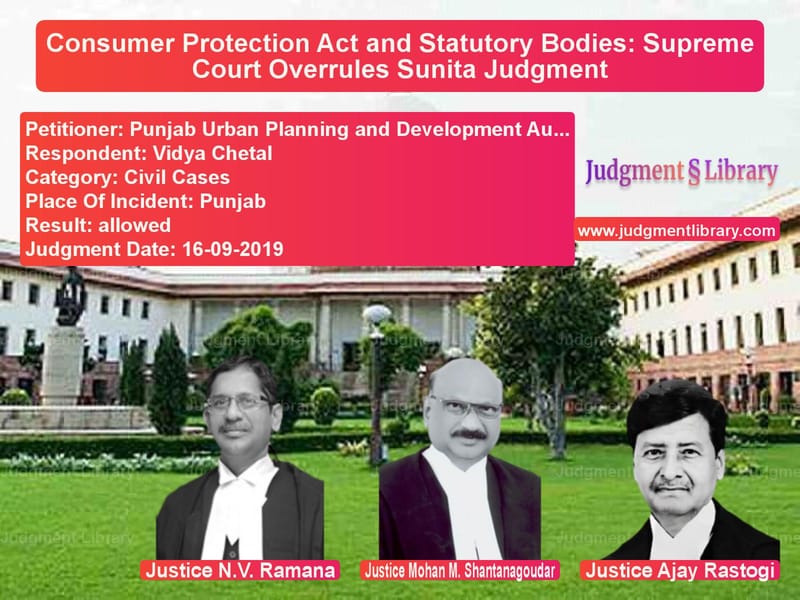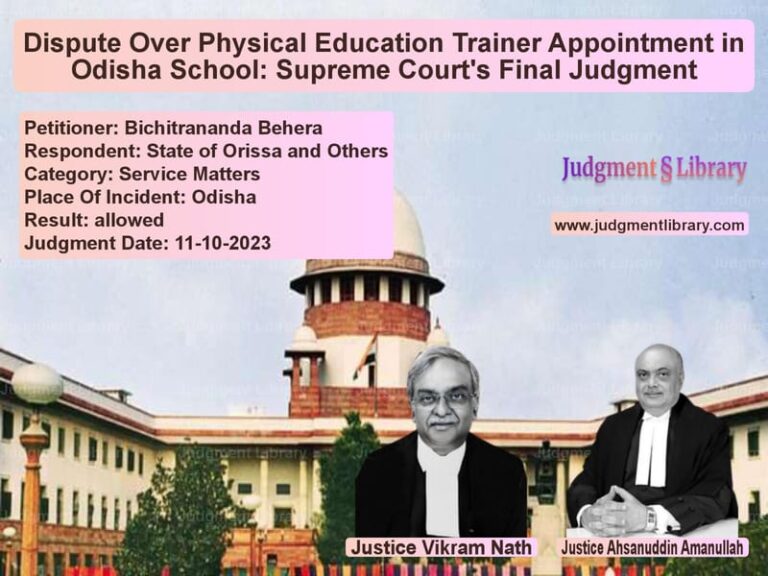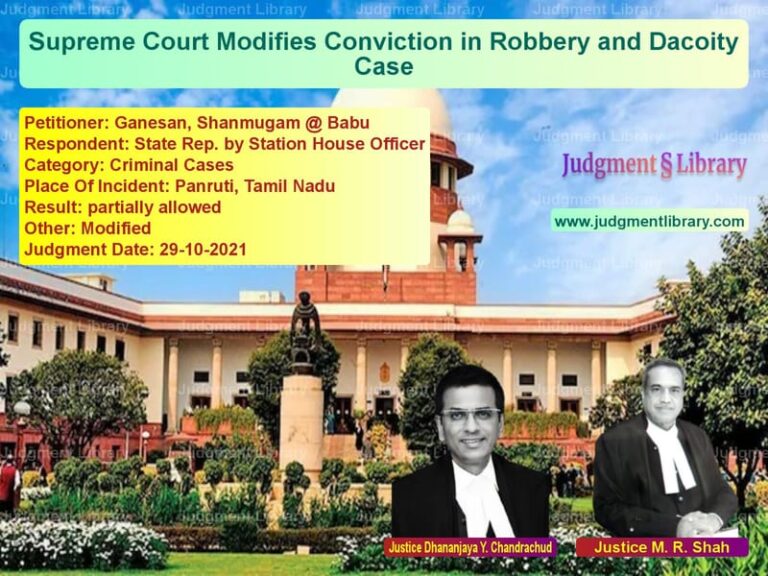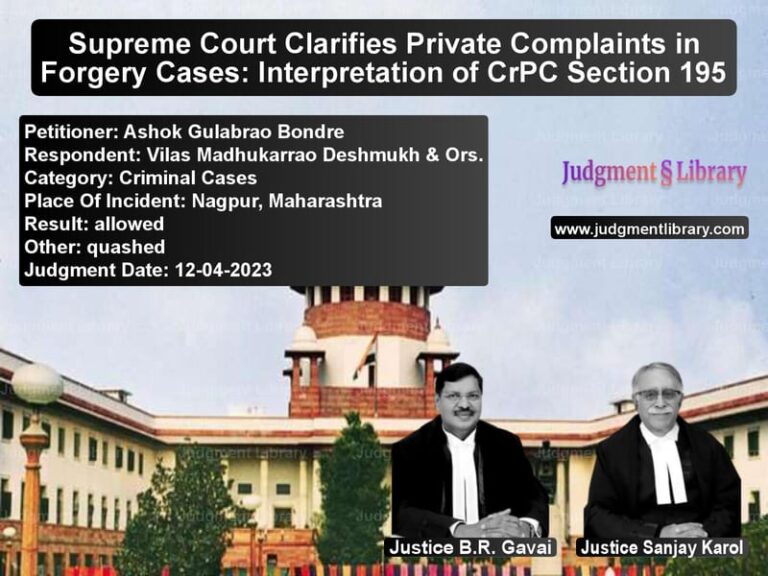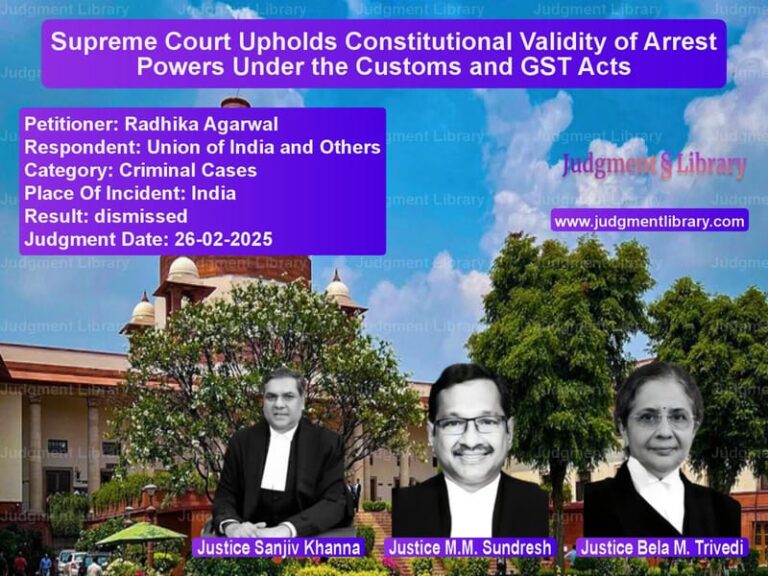Consumer Protection Act and Statutory Bodies: Supreme Court Overrules Sunita Judgment
The case before the Supreme Court arose from the conflicting interpretations of the jurisdiction of the National Consumer Disputes Redressal Commission (NCDRC) in matters involving statutory dues imposed by development authorities. The key issue was whether statutory charges like ‘composition fees’ and ‘extension fees’ demanded by such authorities fall within the scope of ‘deficiency in service’ under the Consumer Protection Act, 1986.
The petitioner, Punjab Urban Planning and Development Authority (now GLADA), contended that such statutory obligations do not amount to a deficiency in service. They relied on the precedent set in HUDA vs. Sunita (2005) 2 SCC 479, where it was held that the NCDRC lacked jurisdiction in such cases. According to the petitioner’s counsel, consumer laws should not be expanded beyond their intended scope to cover statutory obligations that are not contractual in nature.
On the other hand, the respondent’s amicus curiae argued that the Sunita case was an anomaly in a long line of Supreme Court judgments that upheld the NCDRC’s jurisdiction over statutory authorities providing services. Citing Lucknow Development Authority v. M.K. Gupta (1994) 1 SCC 243 and Ghaziabad Development Authority v. Balbir Singh (2004) 5 SCC 65, the respondent argued that consumer courts can adjudicate cases against statutory bodies where a consumer-service provider relationship exists.
Supreme Court’s Analysis and Observations
The Supreme Court extensively analyzed the interpretation of the term ‘deficiency in service’ under Section 2(1)(g) of the Consumer Protection Act. The judgment explained that a deficiency in service refers to any fault, imperfection, or inadequacy in the performance of a service required by law or undertaken contractually.
Further, the definition of ‘service’ under Section 2(1)(o) was considered, which broadly includes services of any description unless provided free of charge or under a contract of personal service. The Court emphasized that the law intends for consumer protection laws to apply even to statutory bodies where services are rendered for consideration.
Key Judicial Precedents Considered
The Court reaffirmed the precedents set in Lucknow Development Authority v. M.K. Gupta and Ghaziabad Development Authority v. Balbir Singh, which established that statutory bodies providing services, including housing development authorities, fall within the ambit of consumer protection laws. The Court noted:
“Any attempt to exclude services offered by statutory or official bodies to the common man would be against the provisions of the Act and the spirit behind it.”
The judgment further cited Commissioner, Hindu Religious Endowments v. Sri Lakshmindra Thirtha Swamiar and Kewal Krishan Puri v. State of Punjab to distinguish between statutory dues that are taxes and those that arise from a quid pro quo relationship between service providers and consumers.
Overruling the Sunita Judgment
The Court ruled that the judgment in HUDA vs. Sunita was rendered without considering key precedents and the broader objectives of the Consumer Protection Act. It held that statutory charges levied by development authorities, which are linked to services rendered, can be subject to consumer law scrutiny.
“The decision in the case of Sunita does not hold good before the eyes of the law and is hereby overruled.”
Final Decision and Impact
The Supreme Court’s ruling reaffirmed that consumer forums have jurisdiction to hear complaints against statutory authorities where services are provided for consideration. However, the Court clarified that constitutional challenges to statutory fee impositions should be raised before constitutional courts rather than consumer forums.
This judgment strengthens consumer rights by ensuring that statutory bodies cannot evade accountability under consumer laws merely by citing statutory obligations. It reinforces the principle that public authorities providing services must be held to the same standards of fairness and accountability as private service providers.
With this ruling, the matter was referred back to an appropriate bench for further consideration on merits.
Petitioner Name: Punjab Urban Planning and Development Authority (now GLADA).Respondent Name: Vidya Chetal.Judgment By: Justice N.V. Ramana, Justice Mohan M. Shantanagoudar, Justice Ajay Rastogi.Place Of Incident: Punjab.Judgment Date: 16-09-2019.
Don’t miss out on the full details! Download the complete judgment in PDF format below and gain valuable insights instantly!
Download Judgment: Punjab Urban Plannin vs Vidya Chetal Supreme Court of India Judgment Dated 16-09-2019.pdf
Direct Downlaod Judgment: Direct downlaod this Judgment
See all petitions in Consumer Rights
See all petitions in Contract Disputes
See all petitions in Damages and Compensation
See all petitions in Judgment by N.V. Ramana
See all petitions in Judgment by Mohan M. Shantanagoudar
See all petitions in Judgment by Ajay Rastogi
See all petitions in allowed
See all petitions in supreme court of India judgments September 2019
See all petitions in 2019 judgments
See all posts in Civil Cases Category
See all allowed petitions in Civil Cases Category
See all Dismissed petitions in Civil Cases Category
See all partially allowed petitions in Civil Cases Category

